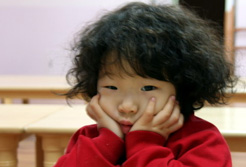 영어토론방 영어토론방 | Home>영어토론방 |
Education School entry age to be lowered
페이지 정보

본문
 School entry age to be lowered
School entry age to be lowered Seeking to reverse a falling birth rate, the government plans to lower school entry age and increase education subsidies to help reduce the costs of bringing up children.
A nationwide campaign against abortion will be conducted and immigration rules will be eased to bring in more foreigners, the Presidential Council for Future and Vision said yesterday.
The panel reported to President Lee Myung-bak a set of measures to resolve the shrinking population.
Korea recorded a birth rate of 1.12, the lowest level in the world, this year. Economic difficulties could drive down the rate to less than 1, the panel warned.
It said the government will push for advancing school entry age from the current seven-years to six-years of age. Korea offers a free elementary school education. The move would help reduce costs for private education and allow more mothers to work, the panel said.
The measures also include increased support for families with multiple children.
It proposed that a family's third-born child be given advantages in university entrance and employment as well as financial support for high school and university fees. Retirement age for parents with multiple children should be extended, it said.
Families with three or more children will be given special interest rates on their mortgages.
It proposed that fathers should be encouraged to use childcare leave. A variety of incentives should be given to companies which hire mothers.
The panel also called for policies to increase the number of foreigners settling in the nation through easing immigration rules and allowing dual citizenship.
It proposed an extensive anti-abortion campaign and measures to mitigate discrimination against single-mother families.
The government will provide support of 1.5 million won ($1,300), up to three times, for each couple undergoing artificial insemination procedures, it said.
Those measures will be discussed further by the panel, government ministries and a special committee under the Prime Minister's Office. They will be finalized early next year, it said.
By Hwang Jang-jin
http://www.koreaherald.co.kr/NEWKHSITE/data/html_dir/2009/11/26/200911260033.asp
School Age May Be Lowered to Five
By Na Jeong-ju
The administration is moving to lower the age of primary school admission by one year to five in a desperate bid to fight the falling birthrate.
It is also seeking to offer incentives to third-born children when they take college entrance exams and seek jobs.
Also planned is the selective permission of dual nationality for ethnic Koreans and talented foreigners, and an active immigration policy.
The Presidential Council for Future and Vision proposed these measures in a report to President Lee Myung-bak Wednesday.
But the council did not specify when the plans will be introduced and how much of a budget would be needed, saying consultation with related ministries was necessary.
"The falling birthrate is one of the biggest challenges for this nation in preparing for the future," Lee said at the meeting. "All ministries need to come up with ideas to tackle this problem. We must take action now."
Policy-makers plan to increase the number of childcare centers nationwide and offer financial aid to couples with children under school age.
In addition, the government is seeking to hold a nationwide anti-abortion campaign, encourage adoption and ease immigration rules to secure a quality foreign workforce.
Families with three or more children will be given discount in interest rates on their mortgages while the government will provide subsidies of 1.5 million won ($1,300) up to three times to couples undergoing artificial insemination.
On Tuesday, Statistics Korea reported that the number of babies born in September dropped 4.7 percent from a year earlier to 38,200, falling for the 19th consecutive month since February 2008. The agency attributed the fall to growing childcare costs and delayed marriages.
The nation's total population is expected to peak at 49.34 million in 2018, compared to the 48.74 million at the end of 2008, and fall rapidly in the following years due to the falling birthrate.
"The council is working closely with ministries to set up a master plan to boost the rate," said Kwak Seung-jun, the council's chairman.
"It is necessary to increase support for working moms and enhance systems so that husbands can share the childcare burden. A safety net for multi-cultural families and single-mother households will also be considered," he said.
http://www.koreatimes.co.kr/www/news/nation/2009/11/116_56167.html
Question
1. Is there any people who enetered school or college early around you?
Do you think that affects one's school or college life?
2. If the government lower school entry age, does it have an influence on our society?
3. When the government opperate this plan, what does have to be supplied? Think about some solutions.
이 글은「대학연합영어토론동아리」www.pioneerclub.com에서 제공하는 영어토론 정보입니다.
댓글목록
등록된 댓글이 없습니다.

